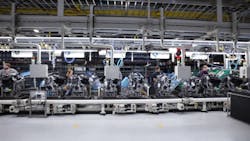Dr. Prasad Akella, founder and chairman of Drishti says it best. “If we can’t get more bodies, we have to give workers more brains.”
While that might sound like a formidable task, it’s not. There is a lot of untapped knowledge in the brains of the frontline workers, but most have been too busy with tasks. “The best ideas for improvement come from the people working the lines and using technology to provide data we can free up their time and allow these ideas to surface,” says Akella.
Creating technology to solve problems in manufacturing is nothing new to Akella who prior to creating Drishti in 2016, led the General Motors team that developed the world’s first collaborative robots.
The company’s tagline –Our vision is to extend human potential in an increasingly automated world – reflects the co-existence between man and technology, but emphasizes the need to employ uniquely human talents, which is a necessity given the escalating labor shortage.
Akella notes that his customers come to him asking for help in solving pressing issues regarding their workforce. The top concern is figuring out how to train workers who are coming from non-manufacturing backgrounds and demonstrate the importance of this work. And secondly, with a daily 10% no-show rate, combined with a 30% labor churn rate, how can companies continue to produce quality products?
Drishti’s answer is to use video to train the new people on the line. Watching a video of how a job should be done helps new associates learn more quickly. Once acclimated, the data from the video cameras on the line can be analyzed to improve performance.
Up the Chain, Not Always Down
The collaborative effort of working with management offers a more evolved environment. “Line associates can give feedback up the chain which doesn’t often happen,” explains Akella. “The data can support the knowledge that the associate has but didn’t have the opportunity to demonstrate before. Better decisions can now be made. And sometimes the issue turns out to be the design, rather than how an associate is working which is generally thought to be the case. Now the process is that together manager and associate will solve the problem.”
Moving into problem-solving can also lead associates on a path to further their careers. “Once an associate thinks differently about the job and becomes more involved, it could lead to the desire for further education of other skills on the plant floor, or other technical skills, which in turn could lead to longer careers in manufacturing,” says Akella.
Future of Video in Manufacturing
Video is an especially adept tool in that it transcends languages and cultures. Drishti, whose customers include Ford Motor Co., DENSO and Hella, also works with medical manufacturing companies. One medical device manufactures that Drishti has assisted has multiple sites and had to train associates in different languages. Instead of having to translate documents as well as send associated abroad, video was a more efficient and less costly way to communicate how procedures were to be conducted.
“We are just in the beginning stages of learning how to use video in manufacturing,” says Akella. “For now we are tacking data but we haven’t even thought of all of the uses of this technology in tandem with AI.”
Using these techniques to create more opportunities for workers to be able to use their work knowledge to solve problems is the intent of the services that Drishi provides. “At the end of the day you must enjoy your work,” says Akella. “You need to be passionate about it and desire to move the needle forward in whatever you are doing.”
About the Author
Adrienne Selko
Sr. Editor
Focus: Workforce, Talent
Email: [email protected]
Follow Me on Twitter: @ASelkoIW
Senior Editor Adrienne Selko has written about many topics over the 17 years she has been with the publication and currently focuses on workforce development strategies. She is also a senior editor at Material Handling & Logistics and EHS Today.
Previously Adrienne was in corporate communications at a medical manufacturing company as well as a large regional bank.
She is the author of Do I Have to Wear Garlic Around My Neck?, which made the Cleveland Plain Dealer's best sellers list.

